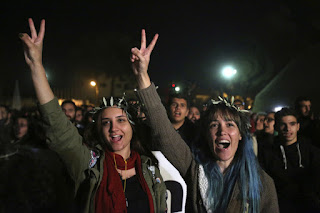When French President Charles de Gaulle and German Chancellor Konrad Adenauer decided 54 years ago to change the course of history and turn their countries’ centuries-old rivalry into partnership, among the first issues they addressed were education, culture and youth.
Because these two leaders knew very rightly that France and Germany could not have a different future without changing the way they brought up their youth. The historic Elysee Treaty signed on January 22, 1963 by de Gaulle and Adenauer called for regular consultations between France and Germany on all important issues concerning defence, education and youth.
As a direct consequence of the Treaty, a Franco-German Youth Office was established to organise exchange programmes and intercultural encounters between French and German youth and courses in each others’ language to strengthen their mutual understanding.
De Gaulle and Adenauer took this step amidst heavy criticism when many people in France and Germany had still not come to terms with the wars and millions of lives lost, and could not imagine their countries working together.
With their vision and courage, they not only achieved the unimaginable Franco-German reconciliation, but laid the foundations of European integration.
On the Treaty’s 50th anniversary in 2013, the then-French Foreign Minister Laurent Fabius and his German counterpart Guido Westerwelle jointly stated that: “Young people are the key to our common future. Our mission is still to teach both countries’ young people the advantages and importance of getting to know their neighbour.”
How is it possible then, that in Cyprus – with a population of just over 1 million and a history much less bloody than that of France and Germany – we are still raising generations of Turkish Cypriot and Greek Cypriots, who don’t know each other, who don’t acknowledge each others’ pains and sufferings, and who don’t speak each others’ language?
How can we expect these youth, systematically subjected to an education that breeds nationalism, hatred and enmity; and reproduces official narratives of violence, communal trauma and suffering caused by “the other”, while conveniently disregarding the suffering and pain of “the other”, to sustain a settlement reached on the table?
There are many official explanations as to why education cannot be reformed, due to high resistance by the right-wing, the church or the media; and why there cannot be any cooperation or contact or exchanges between Turkish Cypriot and Greek Cypriot schools, educators, or students due to the concern of ‘indirect recognition’ of the administration in the north; and why we have to raise our children with hatred and enmity instead of encouraging them to meet, communicate and interact with as many children as possible from “the other side”.There are many official explanations as to why education is a taboo that even the most pro-solution leaders Mustafa Akinci and Nicos Anastasiades have not been able to overcome.
I don’t buy any of them, and neither should you. If our leaderships really wanted positive peace in Cyprus and had the political will and audacity, the first thing on their agenda would have been education and youth. And how can we trust them to have the political will and audacity to transform a divided Cyprus into a united federal country, if they don’t have the political will and audacity to stop poisoning our children?



